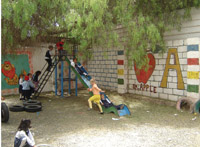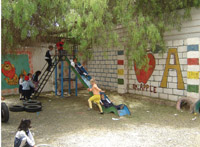
Kindergartens in Yemen: Reality and aspiration [Archives:2007/1035/Reportage]
March 22 2007
 |
Kindergartens and schools are the most important means for a child's development. A child joins the kindergarten at the age of four and then at six he or she is admitted to primary school spending between five to seven hours inside the walls of the kindergarten or school and away from his mother, father and family thereby becoming his or her second home. Thus, teachers of both sexes become role models for the children. The school or the kindergarten is a very different atmosphere from that existing in the child's house, being regimented according to the educational curriculum and other activities along with instilling respect for social discipline and co-operation. He and she will also learn the value of practicing their own hobbies and pursuing new interests. The curriculum enables the child to innovate and develop skills. Further, class activities help the child to exhibit his innermost feelings and satisfy his own scientific interests and wishes. Without doubt, those nations which care about their present and future will invest greater resources in children to help their cultural, social, health, economic development.
The establishment of kindergartens in Yemen
Article 30 of the Constitution of the Republic of Yemen underlines the importance of protecting and caring about children. Building on this, Law No. 45, passed in 1992, and especially Article 16 of that law, states that kindergartens are part of primary education. The kindergartens according to Article No. 17 aim to socialise children between three and six to education and implant healthy and positive customs in their personalities in order to create healthy and educated children who are able to interact with others. Despite these legislative edicts and the early establishment of kindergartens in Yemen, the condition of kindergartens is below the desired level, be that qualitatively or quantitatively.
Kindergartens were set up in the South of Yemen during the 1950s, according to Manger of Expansion and Demand at the General Demonstration of Kindergartens Hassan Al-Misri.
If we make a comparison between the number of kindergartens during 2004-2005 and 2006-2007, we will find that their number has decreased from 261 to 208 kindergartens. While the opposite should be the case this setback was not confined to government kindergartens but to private ones also.
As for the children enrolling in these kindergartens, their number decreased during the academic year 2006-2007 with 1379 children.
The same thing applies to babysitters whose number decreased during 2006-2007 by 184.
According to Education Pointers in Republic of Yemen issued in 2005, the percentage of those children enrolling in kindergartens does not exceed 0.06 percent of the total number of children. It is 0.05 during 2006 according to the same source. This means that more than 3,563,425 children remain outside the kindergarten education system.
General conditions for inaugurating kindergartens:
According manger of expansion and demand at the General Demonstration of Kindergartens Hassan Al-Misri, the conditions that should be met in order to inaugurate a kindergarten include:
1. The building should be one story and separated.
2. It should be good ventilated with enough artificial lighting.
3. There should be open and wide yard and space.
4. All games should be made of plastic.
5. They should have educational means.
6. Babysitters should hold, at minimum, a diploma in psychology, sociology, English language or other relevant educational qualification.
Al-Misri adds that most government kindergartens are attached to girls' schools.
Regarding the application of condition 6 above, Manger of Kindergartens Administration at the Capital Education Office, Adel Al-Shamiri, believes it is applicable to about 80 percent of Kindergartens. However, he is contradicted by the Regulation and Programs Administration Manager at Ministry of Education Faisal Muhalab who believes this condition has been fulfilled by no more than 0.04 percent of kindergartens.
Muhalab believes there are many difficulties and hurdles barring the development of kindergarten education, including the lack of a private or operational budget, which prevents them from expanding or maintaining kindergartens which consequently paralyzes the work in his administration. Further, there is no inspection over the work of kindergartens and the Ministry of Education has no special curriculum for kindergartens.
Raja'a Al-Ariqi, headmaster of the Modern Al-Wissam Kindergarten, sees obstacles in the lack of a specially trained educational cadre something which is, moreover, due to the lack of specialized teaching departments in Yemeni universities. This forces kindergarten administrations to employ secondary graduates or those with little educational qualifications who are then paid very little. Furthermore, the Education Ministry has not conducted any training courses for existing babysitters in order to develop their skills base and professionalism. The lack of a unified curriculum permits each kindergarten to innovate with its own curriculum with some basing their curricula on those taught in other Arab countries. Al-Ariqi criticizes this and considers such adopted curricula unsuitable for the Yemeni educational environment.
A recent report on Yemen's human development issued by Ministry of Planning and International Cooperation in 2004 dealing with knowledge, culture, education and information indicates that most kindergarten programmes focus on teaching reading and writing without giving adequate care to integrated growth programmes. Furthermore, the reports from Ministry of Education inspectors do not reflect reality as they themselves lack the professional competence necessary for evaluating educational programmes. Fatima Saleh bin Ismail, headmaster of 1 June Kindergarten which was established in 1986, believes that the major hindrance to education in kindergartens lies in the lack of a specific budget for them, the lack of a specialised curriculum and separate specially built buildings.
The human development report sees the problem as not just a deficiency in the curriculum, but also to the absence of specially tailored programmes for both talented and impaired children which may adversely affect the child's future achievement.
According to Ibtisam Sharaf Addin, babysitter at Modern Al-Wisam Kindergarten, the difficulties faced by babysitters include the lack of vocational courses and inadequate training to help cope with stubborn, violent and pampered children. Her friend Aisha Al-Midrawi, who has a post preparatory school diploma, admits encountering difficulties in dealing with children especially when they cry or weep from pain and she does not know the reason for their crying and she can't do anything until she has called their families.
Um lila thinks kindergartens are not qualified enough and lack a specialised cadre. Most kindergartens depend on cadres who are just preparatory or secondary school graduates. They never receive any training courses to upgrade their child-caring skills. Thus, we do not trust them and refuse to enrol our children in those kindergartens. Government kindergartens do not meet the required care and professional standards one would expect while the private sector is busy with gaining more money at the expense of service delivery.
Um Ahmed, whose son is enrolled in a kindergarten, assures her son's level of achievement is not good and attributes this to the lack of professional care on the part of kindergartens and the absence of specialised babysitters which, together with lacklustre inspection and evaluation by the Education Ministry, means that kindergartens have no incentive to improve.
Aref Ghaleb notes that kindergartens should be available in every zone as families fear enrolling their children in distant kindergartens. Further, most kindergartens, if not all, do not meet the required standards regarding cadre, facilities and equipments. Head of Kindergartens Department at Hadramout University, Dr. Ali Ba'abbad, believes that there should be qualitative and quantitative expansion in kindergartens because the percentage of those enrolled in these institutions is unacceptable; just 17,000 children.
Ba'abbad asks the governments to construct more kindergartens and train and qualify a specialised cadre to work in them. He further stresses the importance of opening new departments for kindergartens in faculties of education of all Yemeni universities and hiring the graduates of such specialisations.
The human development report includes the following conditions for developing education:
-Supporting education faculties which include specialised departments for kindergartens and early childhood and further assigning jobs for the graduates of these specialisations.
– Consulting specialists and experts to make a specialised curriculum that links children to society and environment.
– Reinvigorating the kindergarten administration at the Ministry of Education and providing it with the experienced, qualified, professional cadre. However, the report did not specify the means of reinvigoration especially under the absence of a specialised cadre and the lack of an official budget.
——
[archive-e:1035-v:14-y:2007-d:2007-03-22-p:report]


